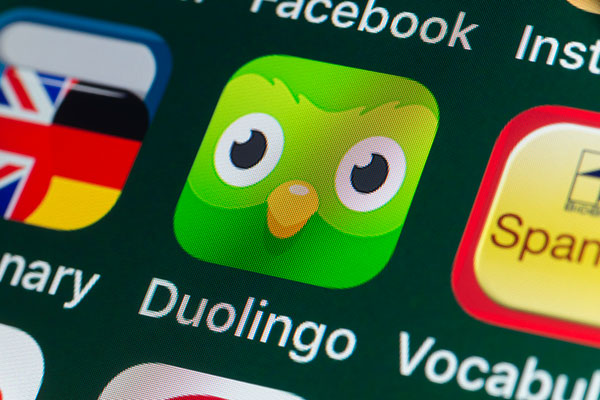Investors hope this pandemic habit will endure
This former unicorn experienced a growth spurt during lockdown. What’s the future for this tech firm?
19th August 2021 13:02
by Nina Kelly from interactive investor
This former unicorn experienced a growth spurt during lockdown. What’s the future for this tech firm with millions of global users?

During the interminable weeks of government-enforced lockdown, while some Britons experimented with sourdough starters or took up a jigsaw to defeat the ennui, others reached for their smartphones and downloaded the free Duolingo (NASDAQ:DUOL) gamified language learning app.
The number of new Duolingo users soared 132% in the UK in 2020, according to the BBC, with the edtech firm describing itself as “the learning product built for the mobile generation: bite-sized, on-demand and fun”.
Duolingo, which offers courses in 40 languages including Welsh, Gaelic and Hawaiian “to approximately 40 million monthly active users”, listed on the Nasdaq last month and has a market cap of $5.1 billion. Chief executive Luis von Ahn, who was born in Guatemala, is a computer science professor and co-founded the company with his PhD student Severin Hacker in 2011.
The S-1 prospectus from Duolingo, which was filed ahead of the IPO, explains that learners who use Duolingo for free “see an ad at the end of each lesson, whereas learners who purchase Duolingo Plus, [the] premium subscription, enjoy an ad-free experience and access to additional features”. According to the company, Duolingo users range from billionaires and celebrities to recently resettled refugees.Alphabet (NASDAQ:GOOGL)'s investment arm CapitalG has a sizeable stake in the business.
- 10 exciting growth shares
- A tech stock we all know that loves to surprise
- Should investors prepare for an autumn market correction?
The Pittsburgh-based company’s website boasts that Duolingo is “the top-grossing app in the Education category on both Google Play and the Apple App Store”, while Time magazine named it among its 100 most influential companies of 2021. The company cemented its place in popular culture when it was the subject of a Saturday Night Live sketch featuring Kristen Stewart called “Duolingo for Talking to Children”.
But while all this sounds positive to potential investors, now that lockdowns are easing, in Britain at least, will language learners still make time for the app? Duolingo is not the only language learning app on the block, of course. Rosetta Stone, Babbel and Busuu are just a few of its competitors and technological innovation, for example, from any of them could mean Duolingo users are tempted to switch with a few simple taps on their smartphone. However, one of Duolingo’s main advantages is that every course it offers is free.
Another fly in the ointment is China. Reuters reported this month that the foreign-listed Duolingo is no longer available for download on some app stores in China following Beijing’s crackdown on edtech companies. However, while being barred access to a population the size of China’s is disheartening for Duolingo, there are many other countries whose citizens are striving for fluency in another language. Duolingo’s 2020 global report revealed that English was the most-popular language followed by Spanish and French.
Past performance and future growth
The S-1 prospectus listed revenue as $70.8 million (£50 million) in 2019 and $161.7 million in 2020, representing 129% year-over-year growth. In the three months ended 31 March 2020, revenue was $28.1 million, and $55.4 million in the three months ended 31 March 2021, representing 97% period-over-period growth.
Aside from in-app advertising and subscriptions, another strand of revenue for Duolingo is its online English language proficiency test for international students, who are particularly lucrative for universities as they usually pay higher tuition fees.

In the S-1 document, Duolingo says that: “As of May 2021, over 3,000 higher education programs around the world accept Duolingo English Test results as proof of English proficiency for international student admissions. These include 17 of the top 20 undergraduate programs in the US, according to US News and World Report, for example, Yale, Stanford, MIT, Duke and Columbia.”
In addition to Duolingo’s aims to expand acceptance of the English test, it is also seeking to “access immigration and workforce markets in countries that require English proficiency assessment as a part of the visa approval or job recruiting and promotion processes”.
But Duolingo’s ambitions stretch beyond languages. Last year, it launched an app designed to teach early literacy skills to children aged three to six.
- Want to buy and sell international shares? It’s easy to do. Here’s how
- Top 20 most-bought US stocks so far this year
- Subscribe to the ii YouTube channel and catch all our latest interviews and video content
In terms of forecasts, within its S-1 filing, HolonIQ, a market intelligence firm, says that: total consumer spend on both online and offline language learning represented a $61 billion market in 2019, and will grow to $115 billion in 2025. Online language learning is the fastest-growing market segment and is projected to grow from $12 billion in 2019 to $47 billion in 2025.
In addition, globally, GSMA, the organisation that represents the interests of mobile network operators worldwide, reports that the number of mobile internet users is projected to grow from 3.8 billion at the end of 2019 to 5.0 billion by 2025. These are certainly encouraging numbers.
Duo the Owl is Duolingo’s mascot. Green and friendly, it has been a figure of fun for the likes of BuzzFeed, and persistently shows up to remind learners to practise their chosen language. Whether this emerging growth company can persist in a crowded marketplace, and even fly higher, remains to be seen.
Duolingo: five facts
- Duolingo and the National Centre for Learning Welsh are working together to help reach a government target of a million Welsh speakers by 2050. Welsh is the fastest-growing language on Duolingo in the UK.
- Scottish Gaelic is one of the newest courses on Duolingo, released on St Andrew's Day in 2019. The course acquired 570,000 learners in under a year, 10 times the number of native speakers recorded in the 2011 census.
- The most-popular languages studied on the Duolingo app in 2020 in the UK were: Spanish, French, German, English and Italian.
- All five of the fastest-growing languages on Duolingo are Asian languages: Hindi, Korean, Japanese, Turkish and Chinese.
- Duolingo also offers High Valyrian (Game of Thrones) or Klingon (Star Trek)…
Source: Duolingo
These articles are provided for information purposes only. Occasionally, an opinion about whether to buy or sell a specific investment may be provided by third parties. The content is not intended to be a personal recommendation to buy or sell any financial instrument or product, or to adopt any investment strategy as it is not provided based on an assessment of your investing knowledge and experience, your financial situation or your investment objectives. The value of your investments, and the income derived from them, may go down as well as up. You may not get back all the money that you invest. The investments referred to in this article may not be suitable for all investors, and if in doubt, an investor should seek advice from a qualified investment adviser.
Full performance can be found on the company or index summary page on the interactive investor website. Simply click on the company's or index name highlighted in the article.